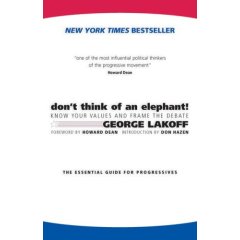George Lakoff, a cognitive linguist at Berkeley, discusses the concept of “framing” in this book, particularly as it relates to political campaigns. But when you read it, you will see its application goes way beyond politics, and that it also brings a lasting conceptual contribution to the world of great psychology books that deal with linguistic persuasion.
He is troubled by the fact that while the values of progressives are often deeply rooted in the American tradition, they often seem unable to articulate their platform in a way that resonates with mainstream voters.
Set against the backdrop of the 2004 election but articulating basic principles that resonate far beyond, Lakoff isolates the ways conservatives have succeeded in framing and defining key issues. It is nearly impossible, he argues, to go up against terms like “pro-life,” “tax relief,” and “family values.” But the author remains hopeful that progressives can learn from the past, successfully reposition their arguments, and reclaim their populist heritage.
In reading Don’t Think of an Elephant I was struck how it is not only a great resource for what “framing” means in a political context, but how it is a powerful concept we can use in our personal and professional lives. Whether it be a serious talk with our partner, communicating with a client or boss, being able to frame our language effectively increases the chances of getting to our communication goals. Read this book with this larger context in mind, and you’ll find “framing” will become part of your life lexicon.


